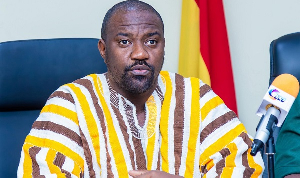Kwabena Agyei Agyapong, a one-time General Secretary of the governing New Patriotic Party, NPP, has restated his view that Finance Minister Ken Ofori-Atta should have resigned months back.
Agyapong, in an interview with Kweku Sintim Misa on the KSM Show said he had expected President Nana Addo Dankwa Akufo-Addo to relieve the minister of his position in July 2022, given his failure to resign.
His position is hinged on the fact that the minister in the last few years has publicly rejected talk of resorting to the International Monetary Fund (IMF) for support amid an economic downturn.
On July 1, 2022, the president in a statement issued by the Information Minister ordered Ofori-Atta to start talks with the fund for a programme.
Agyapong, who is gunning to become the governing New Patriotic Party's flagbearer for the 2024 elections stressed that with his dogged anti-IMF posture, Ofori-Atta became unsuitable for negotiations with the Fund.
“I know how these agencies work and sometimes they want to be very diplomatic. I am sure that they are not happy that he is the one leading it. In their view, they want a stark departure from what happened in the past.
“The first thing I expected was for the president to relieve Ken of his duties, he hasn’t done that, that is his choice but we should expect very tough negotiations going forward and it is not going to be easy,” he told KSM.
Ghana is currently facing economic headwinds with a domestic debt programme facing opposition from stakeholders - largely from institutional bondholders.
Government is hoping to close a deal on debt restructuring at home in order to be able to access an International Monetary Fund (IMF) facility to support the failing economy.
Minister of Finance Ken Ofori-Atta on December 6 announced that government was restructuring bonds held by institutional investors, putting them into four groups stretching 15 years. With interest also spread in four tranches in four years.
The Domestic Debt Exchange programme as it is called has faced some stiff opposition from major professional groups and workers union in the country.
GhanaWeb Excellence Awards nominees reveal video
SARA
General News of Saturday, 10 December 2022
Source: www.ghanaweb.com













